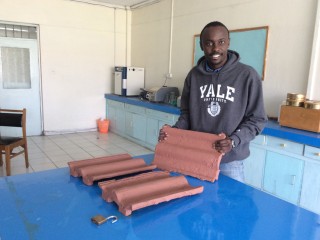Project Results:
Roof tiles from recycled plastic and glass
Turning waste into solid building material
About the project
Cities are under pressure to manage the increasing levels of plastic waste produced by a growing urban population. More than 60% of plastic waste is not collected from the town of Gilgil in Kenya, causing severe blockages to urban drainage systems and polluting natural water resources. TRACE, a social enterprise in Gilgil, has addressed this problem. It created the company Ecotiles Ltd that transforms collected plastic and glass waste into durable, certified eco-tiles.
Key results
-
Tiles are positively tested by Dutch institute on colour stability and durability.
-
13,000 eco-tiles were sold in 2018, at a competitive price than ceramic tiles and with comparative advantages.
-
Refurbishing 1 house with eco-tiles creates wages for 50 plastic waste pickers a day. Approx. 2000 eco-tiles are required for a house, which is the equivalent of 1500 kg of plastic waste removed.
-
Employment opportunities for young people and low-income members of the community. A network of 11 community-based youth and women organizations has been established to collect and shred the plastic waste from approx. 500 waste pickers.
-
18 young people from the local community have been trained with new eco-tile production skills.
-
A technical innovation: a sound product that outcompetes most of the locally available options in many spheres such as beauty, durability and cost.
-
A social innovation: changing the way people view waste, from being a nuisance to actually a resource of higher commercial value that provides end products of high quality.
Challenges/Tips for the future
-
Engaging the community from the very beginning and working closely with their potential clients has created circular economy opportunities to meet the demands and needs of end-users.
-
A technical focus on production and product quality is fine, but sales needs attention, too.
-
Referral marketing is an important strategy.
-
An effective marketing strategy is through masons that received special training
Potential for growth
Daily output could increase to 3,000 tiles in 3 labour cycles. With profits growing steadily (forecast 2019 net profit: € 20,000) this is a very valid business case. By significant investing in sales and marketing, quadrupling revenues by the end 2020 is very well possible.
Project partners
WASTE NL, Tereco (PTY) Ltd, NetFund, Africa Funded
Period
February 2016 – December 2018
Location
GILGIL, KenyaLast project updates
Background
The pilot is based in Gilgil, Nakuru County in Kenya. Nakuru is the fourth largest urban centre in Kenya after Nairobi, Mombasa and Kisumu and also among the fastest growing towns in East Africa. This has led to intensive pressure for urban environmental services such as solid waste management which the county government has been overwhelmed in managing. The town produces approximately 300 tonnes of waste per day with less than 60% being collected.
Project Plan
1. Comprehensive business feasibility plan will be done in the first half of the project
2. Pilot production line will be set up in Gilgil in the first half of the project
3. Product tests will be conducted to maintain quality of products during the second half of the project
4. Pilot sales to launching clients will be done during the second half of the project
5. Knowledge sharing will be done during the last quarter of the project
Target group
We target middle income Kenyans looking for quality but affordable construction materials. Also through the value chain, we target to improve the lives of young people mostly informal waste pickers who are marginalized and mostly looked down upon in the society. Job opportunities will be created through the supply of waste input materials to our company. 40% of all job opportunities will be reserved for women to enhance gender equality.
Sustainability
Project follows FIETS Principle; Financial: Profits from production of new eco-friendly roofing tiles in the Kenyan market. Institutional: Trace will partner with local institutions including county governments and offer a solution to managing municipal waste. Environmental: Over 30 tonnes of post consumer waste will be diverted from the environment. Technology: The implementation of "circular economy" will be used to make use of recycled waste materials. Social: Jobs will be created directly in the manufacturing process and indirectly through supply of waste materials for the production process.
Overview of Goals
To enhance cleaner urban cities, reduce blockage of urban drainage systems clogged by plastic waste and promote job creation in the recycling process in Kenya
Results and indicators
- Reduced waste pollution in urban cities of Kenya
- Reduced waste pollution by plastics and glass
- % of waste diverted
- Tile producing installations operational
- Tile producing installations operational
- Plastic roof tiles produced
- A pilot production line producing tiles and manholes

